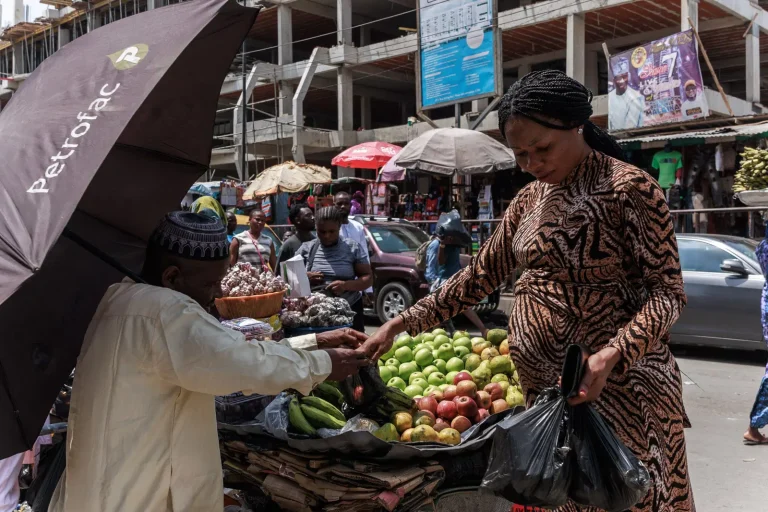Residents and stakeholders in Kogi, Niger and Nasarawa have expressed mixed reactions to the recent drop in prices of major food items, even as they appealed for sustained government interventions to prevent a reversal.
In Kogi, a survey by the News Agency of Nigeria (NAN) in Lokoja Old Market and Mami Market on Sunday, showed noticeable reductions in the prices of rice, beans, garri, tomatoes, yam and vegetable oil.
A 50kg bag of rice, which sold for between N58,000 and N62,000 in Sept, now goes for N48,000 – 51,000. A measure of garri (granulated cassava flakes) dropped from N2,200 to N1,200, while tomatoes now sell at N600 – N700 per measure, down from N1,200.
Alhaji Ahmed Musa, a trader, told NAN that although the new prices had brought relief to consumers, many traders were recording losses.
“As a trader, I’m not making profit. Prices of maize, rice and beans have dropped drastically, and we are selling at a loss,” he said.
He noted that a 100kg bag of maize had fallen from N90,000 to N40,000; beans from N95,000 to N45,000; and rice from N80,000 to N51,000.
He attributed the declines to Federal Government policy interventions but urged more support for farmers and traders to cushion the effect.
Mr Joel Okpanachi, an Economist, warned that persistent low prices could discourage farmers, especially amid insecurity and high input costs.
“One fortunate thing this year is the bumper harvest, despite high input costs. Government must prioritise smallholder farmers in the next budget,” he said.
Okpanachi, however, warned that food shortages could occur next year if production cost remain high and insecurity persists.
Mrs Grace Babarinde, a yam seller, said the price reduction had boosted patronage, while a father of four, Mr Sule Abdullahi, described it as “long-awaited relief”, noting that his weekly food expenses had dropped by nearly 30 per cent.
He cited improved supply, better road access and recent policy measures as contributing factors, and called for sustained support for farmers, stable fuel supply and improved access to farmlands.
Another trader, Mr Musa Gbemiro, urged government to avoid policy inconsistency and invest in irrigation, rural roads and storage facilities to keep prices stable.
In Niger State, checks across markets Minna, Suleja, Kontagora and Bida showed modest price reductions of between four and 12 per cent for rice, maize, yam, beans and tomatoes.
At Minna’s Kure Ultra-Modern Market, a 50kg bag of local rice now sells for between N44,000 and N47,000, down from N50,000, while a measure of beans dropped from N2,200 to N1,900.
Traders attributed the reductions to improved harvest and more stable transport costs following improved fuel availability.
Dr Maryam Gana, an Economist, said government must expand farmer credit, upgrade rural roads and strengthen security around farmlands to maintain the trend.
Mr Ahmed Sabo, a grain merchant in Shiroro, urged government to stabilise prices of inputs such as fertiliser and seedlings, while Mrs Mary Dauda, a buyer, appealed for continued support for local producers.
In Nasarawa State, residents and traders called for subsidised inputs, modern storage facilities, regulation of middlemen and tax incentives to sustain the downward price trend.
Mr Haruna Abdullahi said subsidising seeds, fertilisers and farm equipment would help stabilise production, while others advocated a price control board to regulate market fluctuations.
Traders including Mr Nicodemus Thomas and Mr Hamza Isa, stressed the need for modern storage and preservation systems to curb post-harvest losses.
Residents such as Mrs Ladidi Ibrahim and Mr Joseph Audu, called for regulation of middlemen to prevent exploitation and ensure farmers earn fair prices.
A NAN survey across markets in Lafia and other towns showed that a 50kg bag of rice now sells for N56,000, down from N85,000, while a 25kg bag dropped from N43,000 to N27,000.
A measure of beans dropped from N3,500 to N2,000, guinea corn from N1,400 to N500 while corn and millet also recorded significant reductions.
Residents such as Mrs Hauwa Mohammed, a civil servant, and Mrs Blessing Odama, an entrepreneur, expressed delight with the downward trend.
Mohammed said the new prices had restored hope among households struggling to feed their families, while Odama said she had resumed saving due to reduced food spending.


